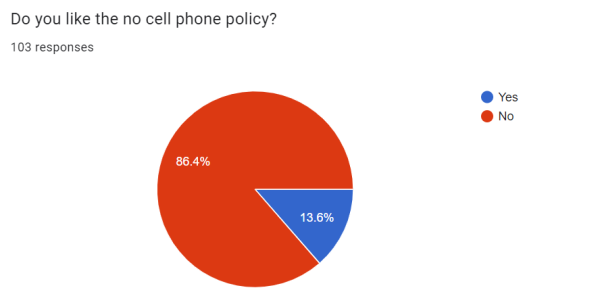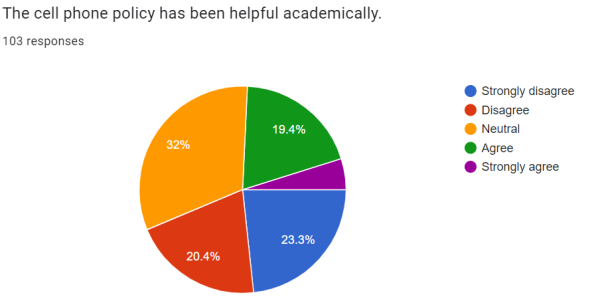The time of the cell phones can be expressed in many ways.
It was a digital culture.
A distraction.
A lifestyle.
But, all this has come to an end with the start of the 2024-25 school year with the start of a new no cell phone policy. This sweeping change has allowed the administration to tackle problems related to plagiarism and distraction. However, it has also sparked a wave of apprehension and unease from the student body.
In a survey taken by the RoundUp of over a 100 students, 86.4% of respondents said that they did not like the cell phone policy and over half of them answered that the policy has not been helpful socially. However, nearly a quarter of the respondents suggested that the policy has been helpful academically. Overall, Associate Principal Matthew Warren has described this policy to be a cultural change.
“We’re excited to see how much more engagement and much deeper understanding of content there is, so you’re not drawn for that three seconds away from the conversation to look at your phone and then come back in,” Warren said. “So we’re very excited and encouraged by what we’ve seen so far, but it is a big change, and it’ll be a change.”

AP U.S. History teacher Kelsey Bates said that she absolutely loved the no cell phone policy.
“I think it’s better for education, I think it’s better for the school, like culture, everything,” Bates said. “I think, I know, just life in general, a lot of times people are planning for the future, people are thinking about the future, thinking about next class, and they miss out on the current, right? And so that’s where I think it helps them focus in class more without being distracted.”
Warren said that a lot of thought went into this phone policy and teachers, students, parents, and the staff all had a big contribution in this policy.
“The efforts that went into this policy were just calibrating,” Warren said. “So teachers have what’s called a PLC, so Professional Learning Community. The teachers of a certain content get together and they calibrate to make sure what they’re doing for the kids is best when it comes to instruction, assignments, rigor, those kinds of things. So we try to calibrate, follow the policy to what’s best for kids.”

Sophomore Trisha Sahu said that even though many students speculated that this policy would come into effect, it was a very big shocker especially for students in senior grade levels. She believes that the cell phone policy takes away her cell phone privileges.
“Honestly, last year, the cell phone usage during when teachers taught or even after teachers taught was really high,” Sahu said. “I would see kids just be on their phones when the teachers taught lessons and definitely that’s not good. So I kind of expected a rule like this to come eventually.”
Sahu speculates that the big reason for the enforcement of this policy is cheating and distraction. Junior Joshua Yuan said that the policy has provided the students with an incentive to cut out distractions. According to the survey, 49.5% students say that the cell phone policy has not helped cut out distractions however the other 50.5% students agree or are neutral on the thought that the cell phone policy has helped cut out distractions.
“I feel like the distraction bit can be reduced by blocking some websites,” Sahu said. “But either way, kids are going to find out a way how to distract themselves, find some game websites which are not blocked and they’re going to distract themselves either way. But yeah, it could be preventive but not 100%.”
Teachers are employing different rules to make the transition from the no cell phone policy to be easier and smoother.
“So during my lectures, I have what’s called turn and talks, and every couple slides they’ll turn and they’ll have to discuss something, or look at a political cartoon,” Bates said. “Or I have trivia questions every once in a while, like what do you know about the president we’re about to talk about? So I do those to kind of break up the lectures, and so it also gives them a chance to kind of talk.”
Warren describes the cell phone to have an addictive nature and Bates says that one needs to have a strong willpower to completely overcome the distraction.
“Honestly, set time limits on apps that you use a lot,” Sahu said. “Turn your phone black and white to make it less interesting or turn off notifications.”
Even though the phone has been discredited for all the distractions that come along with it, it can be highly beneficial in many circumstances. Bates said certain review methods like Kahoots work better and are easier to access on the phone, and that students need to be cognizant on how they use their phone.
“I do know that my phone does a lot for me in terms of like planning for my family, and reminders, and I probably have 20 alarms,” Bates said. “So yeah, that’s where I do rely on my phone a lot in that sense. And I know that there are ways that technology can help them like with deadlines and things like that, remembering things and reminders and to-do lists.”
Sahu believes that the one to one laptop policy that has been introduced in order to replace the phones has not been that well received by the students. She said that even though the phone is distracting, the “benefits of a phone outweigh the laptop definitely”.
“It’s [The laptop is] really heavy, and it has to be carried around,” Yuan said. “And you can’t refuse the laptop, and if you damage it, you have to pay up to like $300-$500 for it to be replaced. So for me, the cell phone policy is pretty good, I just really don’t like the laptop policy.”
Ultimately Warren said that the phone policy aims for the personal growth of the students.
“Once you get in the real world, once you get in the workplace, if you decide to go to college, a career, the military, you need to be focused on the task at hand,” Warren said. “This is just one more thing to where it’s hopefully a life skill that we can learn while we’re in high school before we get into the real world. Whichever, whatever that may look like, to put away the distraction and focus at hand on the work that needs to be done.”
This story was originally published on The Round Up on September 3, 2024.



































